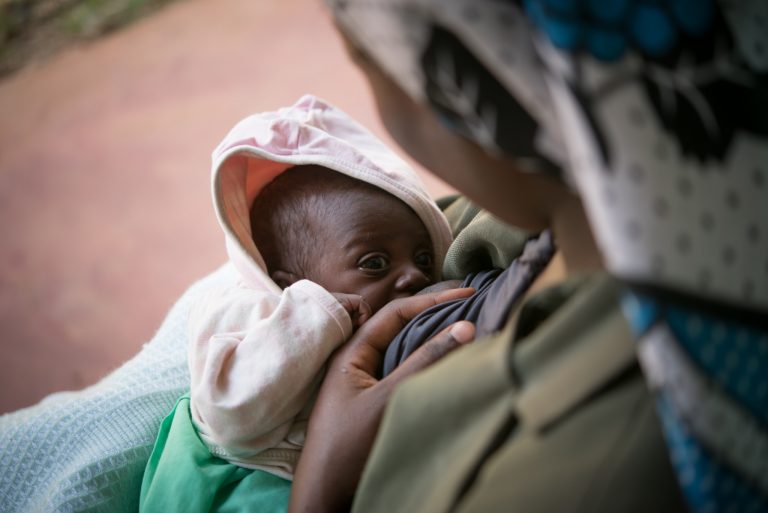By: Constance Gathi & Brenda Ahoya, Kavle Consulting, LLC and Rose Wambu, Division of Nutrition, Ministry of Health, Kenya. This blog was originally posted on the Kavle Consulting website.
The 2021 World Breastfeeding Week theme “Protect Breastfeeding, A Shared Responsibility” provides a call to action to build an enabling environment for breastfeeding via a “warm chain” of support among key actors at various levels (i.e., workplace, health system, communities). Comprehensive support at all levels is critical to restoring gains in breastfeeding that have been potentially lost due to the COVID-19 pandemic.
Breastfeeding during the COVID-19 Pandemic: Kenya
WHO recommends exclusive breastfeeding for six months, with continued breastfeeding to two years or beyond, alongside complementary feeding while implementing precautions to protect breastfeeding women against COVID-19. Breastfeeding is a critical preventative intervention to combat child illnesses, rising child malnutrition, and early child death due to COVID-19 estimated disruptions in health and food systems.
While Kenya is on track to achieving World Health Assembly (WHA) targets with 61% of children below six months being exclusively breastfed, the COVID-19 pandemic is threatening these gains. Since the advent of the COVID-19 pandemic, some health care workers held the incorrect belief that infants may be infected with COVID-19 through breastfeeding, which was often passed on to Kenyan mothers. In addition, anecdotal evidence reveals that there are gaps in enforcing the International Code of Marketing of Breastmilk Substitutes (i.e., the Code), especially in private hospitals in Kenya.
How has the infant formula industry changed tactics in Kenya amidst COVID-19 since August 2020?
Since last year’s efforts by the Government of Kenya (GOK) detailed in “How Kenya is fighting back to protect breastfeeding: Addressing infant formula industry tactics during COVID-19,” which highlighted Breast Milk Substitute (BMS) companies’ strategies to target professional associations and health care providers to promote BMS use and undermine breastfeeding, the infant formula industry has employed additional tactics. This year, BMS companies continue to use unauthorized channels to target health workers, including marketing infant formula through social media platforms, as well as TV and print media. To further increase their reach, BMS companies have even financially supported county health activities, such as the recent launch of a country nutrition action plan. Other challenges include the infiltration of unregulated BMS products from neighboring countries, inadequate staff to monitor code violations, as well as inadequate health provider knowledge and skills on the Code.
How is the Ministry of Health Kenya continuing to support and protect breastfeeding amidst these challenges?
In August 2020, the GOK referenced four actions to address infant formula industry tactics, which included disseminating WHO’s guidance on breastfeeding and COVID-19, drafting regulations on penalties for Code violators, releasing a statement to infant formula companies that will guide action for Code violators, and creating awareness on the Code among stakeholders. In 2021, the GOK through the Ministry of Health, Kenya has taken the following actions at various levels to support and protect breastfeeding:
- Reviewed breastmilk substitutes (Regulations and Control Act), No. 34 of 2012 to strengthen clauses with regards to more stringent legal action against Code violators (*currently in process)
- Worked with the Ministry of Trade to monitor donations of BMS from other countries. For example, GOK rejected over 90 tons of BMS that had been donated to the country
- Sensitized the media on the Code
- Disseminated key messages on the Infant and Young Child Feeding (IYCF) during COVID-19 to counties and the health workforce (i.e. nurses, nutritionists, community health assistants, public health officers, clinical officers), in support of exclusive and continued breastfeeding
- Reviewed the Maternal Nutrition and Infant and Young Child Nutrition (MIYCN) guidance to incorporate WHO’s Breastfeeding during COVID-19 guidance
- Designed 3- and 5-day capacity building courses on BMS for frontline health care workers and health staff to ensure enforcement of the BMS act – which was rolled out in a few counties
What opportunities is the Ministry of Health Kenya leveraging to protect and promote breastfeeding?
Although challenges persist, moving forward, the Ministry of Health Kenya, has prioritized five key actions to protect and support breastfeeding:
- Baby-Friendly Platforms: Use of the Baby-Friendly Hospital Initiative (BFHI) and Baby-Friendly Community Initiative (BFCI) platforms to reach facility and community-based health workers and mothers through mother-to-mother support groups, which aided to dispel COVID-19 myths and misperceptions around breastfeeding
- Facility-Community linkages: Certification of BFHI hospitals (i.e, Kakamega) and BFCI communities (i.e., Migori/Kakamega) demonstrates these platforms’ potential to reach and support breastfeeding mothers during the COVID-19 pandemic through the involvement of various stakeholders
- Government: Continue collaborations with other line ministries, including the Ministry of Labor and Social Protection as well as county governments
- Workplace: Strengthen workplace support for breastfeeding, which includes breaks for breastfeeding, and providing equipment and storage for breastmilk expression – so working mothers can take expressed milk home to their infants
- Private sector health care: Expand inclusion of private hospital staff into MIYCN technical working groups and in the newly proposed Kenya National IYCF committee to strengthen implementation of the IYCN policy in private health facilities
Breastfeeding is a shared responsibility that requires all stakeholders to actively take part in protecting, promoting, and supporting breastfeeding in Kenya.
